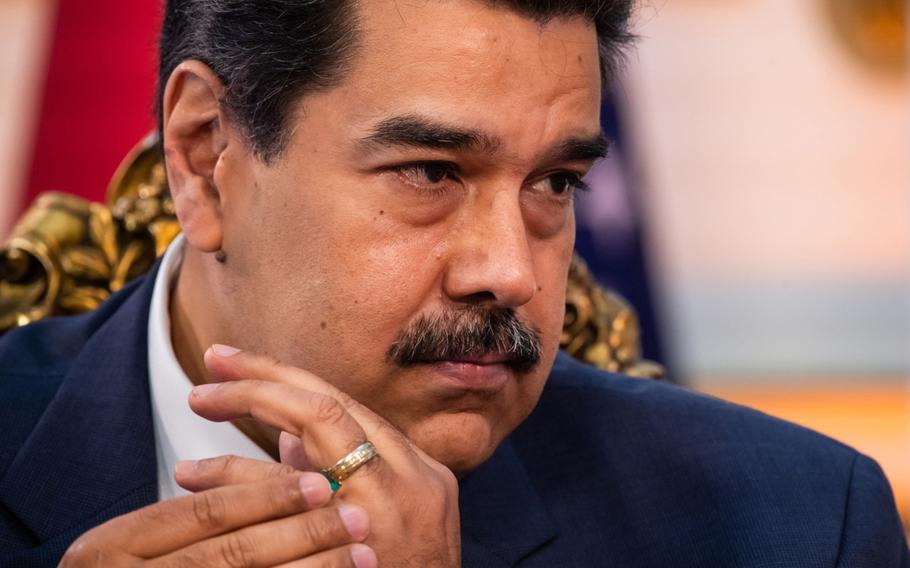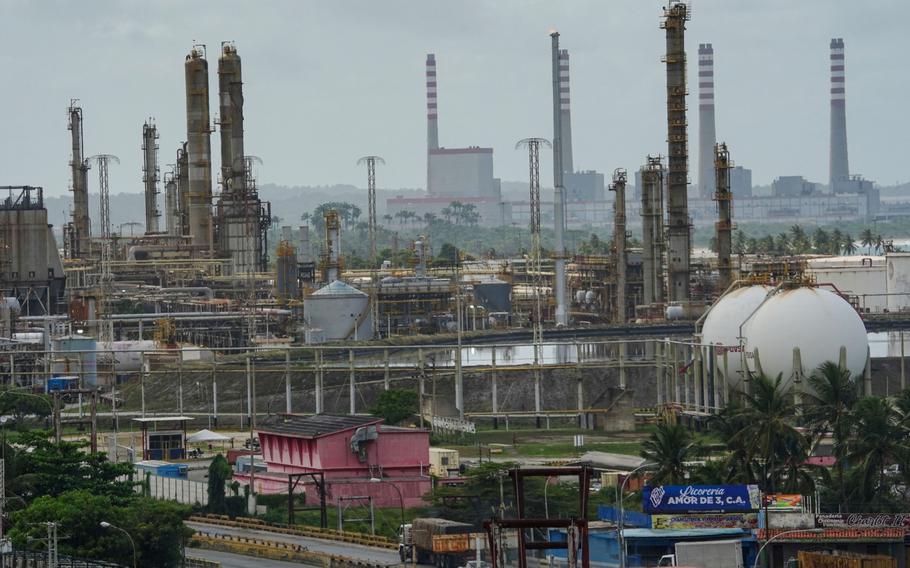
Venezuela’s President Nicolas Maduro listens during an interview in Caracas on June 13, 2021. (Gaby Oraa/Bloomberg)
Confronting a conflagration in Eastern Europe after the Russian invasion of Ukraine, the Biden administration has redoubled efforts to put out fires elsewhere - seeking to accelerate a nuclear deal with Iran and ease strained relations with Saudi Arabia and the United Arab Emirates.
But Washington's most receptive rapprochement is unfolding in fits and starts closer to home, in a country the Kremlin has sought to turn into its most distant satellite: authoritarian Venezuela.
Senior U.S. officials this month held their highest-level meeting with Venezuelan President Nicolás Maduro in years. The session with Maduro, his influential first lady Cilia Flores and a small number of other top lieutenants was described by several people familiar with the encounter as "cordial," and successful in establishing personal rapport. Despite White House efforts to downplay the meeting after a backlash by Maduro critics - particularly the powerful Democratic senator from New Jersey, Robert Menendez - lines of communications between Caracas and Washington remain "open," these people say. They spoke on the condition of anonymity to discuss sensitive information.
There had been discussion of a follow-up meeting, but the administration appears to be weighing the pros and cons of further direct talks.
Even considering such a dialogue was previously unthinkable. The Trump administration had courted North Korea's ruthless leader Kim Jong Un. In contrast, it launched a "maximum pressure" campaign against Maduro - a figure widely reviled by the Venezuelan and Cuban diaspora in the United States. Trump's hard line was a gift to Florida Republicans, who made substantial gains in exile-heavy Miami-Dade County and won Florida, if not the 2020 election. A U.S. ban on Venezuelan crude devastated the OPEC nation's already-troubled oil industry. The United States shuttered its embassy in Caracas. Direct flights between the United States and Venezuela were halted. The U.S. Justice Department indicted Maduro on narco-trafficking charges.
The Trump administration backed opposition figure Juan Guaidó as the country's rightful leader and predicted Maduro's imminent fall. None of it worked. Support for Guaidó would crumble at home. Maduro's opposition, always fractured, has descended into infighting. Some observers give Guaido's interim government to the end of the year until it unravels. Maduro's grip on power, meanwhile, has only strengthened - along with Russia's footprint in Venezuela.
A possible shift in policy under Biden never materialized, as observers viewed the administration as either fatally indecisive or exceedingly cautious - eager not to alienate Menendez as well as a key niche of Florida voters.
Enter Moscow's invasion of Ukraine, the surge in global oil prices and the unmasking of Russian President Vladimir Putin as an existential threat. The visit this month from a U.S. delegation that included Juan Gonzalez, the National Security Council director for the Western Hemisphere, and U.S. Ambassador to Venezuela James Story yielded the release of two American citizens, including a former executive of Citgo, once part of Venezuela's state oil company. Freedom for a third American - a former marine who Venezuelan officials insist is a covert American operative - came close to happening but didn't.
In Washington, the narrative of the visit has largely centered on oil - the potential of easing the U.S. ban, and creative deals that would allow Western companies, including California-based Chevron, back in. But Venezuela's oil industry is in dire straits - with poor infrastructure that would take billions of dollars of investment to improve, along with months to significantly increase production. A deal could have a psychological impact on markets. But even the most generous estimates suggest Caracas could only ramp up to about 15 percent of Saudi Arabia's current output in the medium-term. In short, Venezuela is unlikely to be a massive factor in lowering gas prices at American pumps.
But the American rapprochement is also about geopolitics, and countering the already-deep Russian-Venezuelan alliance.

The Petroleos de Venezuela El Palito refinery in El Palito, Venezuela, on March 9, 2022. (Manaure Quintero/Bloomberg )
That alliance is based on oil deals. But it comes with military cooperation that should worry Washington. Between 2006 and 2013, when Maduro's predecessor Hugo Chávez died of cancer, Venezuela bought nearly $4 billion in Russian military equipment. In late 2018, two nuclear-capable, long-range Russian Tu-160 bombers arrived under sunny skies at Maiquetia International Airport outside Caracas, met by senior Venezuelan military officers who saluted and shook hands with the pilots. The Russians later took part in joint exercises. A year later, Moscow dispatched dozens of Russian military personnel and tons of equipment to Venezuela.
The administration has publicly laughed off post-invasion suggestions by Moscow of ramped up military cooperation with Caracas. The Russian military is now so stretched in Ukraine that a replay of the 1962 Cuban missile crisis in Venezuela appears far-fetched. But that doesn't mean the United States can't keep Moscow second-guessing about its web of alliances, particularly in Latin America. Maduro's government was unnerved Russia's invasion of Ukraine, fearing Washington could one day use the "not-in-my-backyard" argument against Caracas. After the U.S. delegation's visit this month, Moscow was sufficiently alarmed to summon Maduro's No. 2, Delcy Rodriguez, for a meeting in Turkey to review their strategic alliance.
The Venezuelan government, according to two people familiar with its thinking, is interested in continuing the direct talks. But critics say the administration has mismanaged its attempted opening - failing to brief key players on Venezuela policy and suddenly backtracking when the trip sparked an easily anticipated backlash.
Menendez, whose key vote the administration will want on any nuclear deal with Iran, was livid over being blindsided. Guaidó, equally caught off guard, was sufficiently furious as to fire off a personal letter to President Biden.
The problem may be partly one of sequencing and forum. Menendez co-sponsored the 2019 Verdad Act that enshrined the search for a "negotiated solution to Venezuela's crisis" into U.S. law. He may not necessarily be opposed to easing U.S. sanctions if Maduro agrees to concrete steps toward restoring democracy, though he is likely to seek movement through a currently stalled dialogue in Mexico with Maduro's opposition. His biggest beef, echoed by other critics, is over the chance that Maduro could be rewarded with oil deals just because his ally Putin is wreaking havoc in Ukraine.
Restarting the Mexico talks was a key request by the U.S. delegation that visited Caracas. But the opposition remains so fractured that progress without direct U.S. talks would be slow. Maduro, meanwhile, has cracked a U.S.-backed isolation campaign, already earning a softening stance from the European Union. With leftist presidential candidates who are signaling an even gentler stance toward Caracas leading in the polls in Colombia and Brazil, it may be only a matter of time before Maduro shatters it.
The question for the administration is whether it's willing to close a door it just opened, and whether that gives Putin room to expand his reach in a country that sits three hours by plane off the coast of Florida.